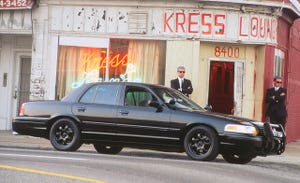Daniel Werner did not want his first engine swap to be tame. He wanted something big. Not some LS-swapped whatever, big for a Miata but puny on the broad spectrum of internal combustion. He wanted something no car motor could provide. He considered a 37-liter Rolls-Royce Griffon engine, a massive thing plucked from a Spitfire fighter plane. But that’d be ridiculous, far too big for a car. Cooler heads prevailed; he went with a comparatively tidy 27-liter Meteor engine from a World War II–era tank.
“It’s not an intelligent choice of engine if you want to have 250o horsepower and race. This is more just, I wanted to do this out of pure passion,” Werner told Road & Track.
Living in Sweden, a country dominated by 2.0-liter hatchbacks and tight emissions controls, Werner was always enamored with big-engine forbidden fruit—V-8 muscle cars, sure, but also wilder stuff. He knew he needed to scratch that itch, so he started searching for a suitable engine. The 37-liter Griffon was too unwieldy and could be tough to come by in the region, but Meteor-powered Swedish tanks were comparatively plentiful. Since Sweden hasn’t had much need for tanks in the past decades, the country always has surplus engines.
This content is imported from YouTube. You may be able to find the same content in another format, or you may be able to find more information, at their web site.
Werner also considered the Merlin—the aerospace version of the Meteor, with a supercharger and a different camshaft—but even that wasn’t going to make the power he wanted. Meteors make about 550 horsepower from the factory; Merlins can get close to 2000. Werner’s goal is 2500 hp. And with the help of two of the biggest turbochargers on the market and a custom ECU (the Meteor originally had magneto ignition), he thinks he’s gonna get it.
But if a Bugatti is pushing the limit with 1500 horses, finding a suitable platform for the 2500-hp Meteor became its own challenge. He wanted an old Rolls-Royce, but any sturdy example was too expensive to justify cutting up. He needed something cheap, easy, and body-on-frame. Lucky for Werner, he found a 2006 Ford Police Interceptor imported from Stockton, California. Bad powertrain, good everything else. Perfect.
Even a Crown Victoria has a weight limit. The front end of the car wasn’t built for the massive tank engine, so Werner started adding parts to support it. He started out adapting parts from a C4 Corvette, then scrapped that plan. Now, he’s working on fitting a Chevy C-10 pickup-truck front end to cope with the weight. Redline is currently at 3000 rpm, but he’s working on getting the massive engine to scream all the way to 4000. Fuel will be supplied by two massive injectors for each cylinder, capable of supplying a total of 24 liters of fuel per minute without stuttering. This won’t be a long-distance cruiser, though: Left running for more than a few minutes, the Meteor will boil all its coolant.
This content is imported from Instagram. You may be able to find the same content in another format, or you may be able to find more information, at their web site.
Werner’s not interested in making it a drag racer. Even if he found tires that could handle a hard launch from this engine, that would just lead to busted transmissions, even with military-spec upgrades to the TH400 transmission. Instead, he wants to take it on a high-speed run to over 200 mph. Werner is sure the finished machine will be capable of running way past 200 mph mark, but he’s not gonna push it. After all, the Crown Vic was never meant for that kind of speed.
Some probably wonder why Werner would bother building such a ridiculous ride. It won’t be much good in any kind of sanctioned racing, won’t be the best looking custom build, and will require a lot of specialty work from mechanics trained on the 60-year-old engine. But what the so-called Meteor Interceptor has been able to do is get attention, with thousands following along on Facebook, Instagram, and YouTube. And that speaks to his ultimate goal. He wanted something new, fresh, exciting, and interesting.
“It will not be an ideal car in any way,” he says. “But for me, it’s ideal. Just 1647 cubic inches is cool enough.”
Main image provided by Patrik Karlsson. You can find him on Facebook and Instagram.
This content is created and maintained by a third party, and imported onto this page to help users provide their email addresses. You may be able to find more information about this and similar content at piano.io






